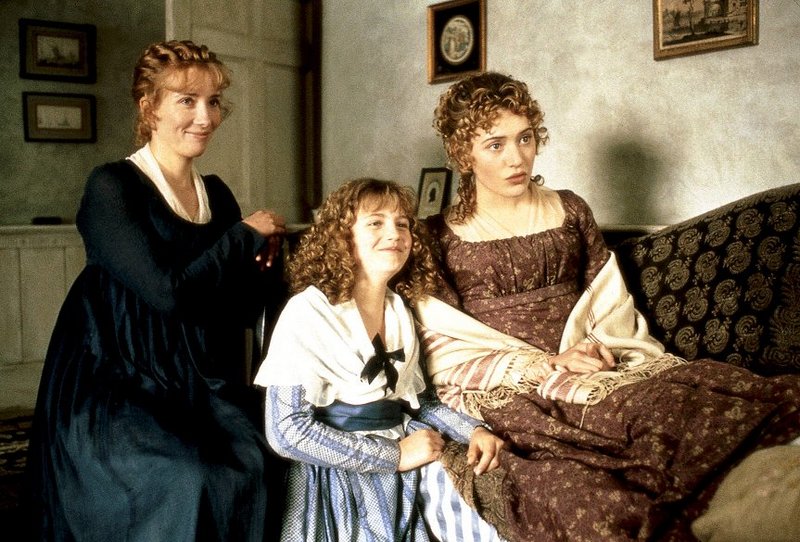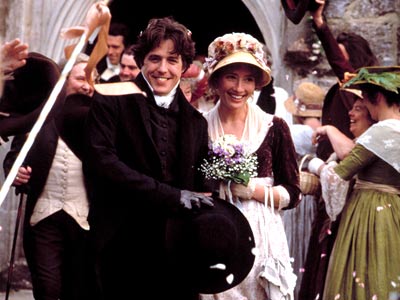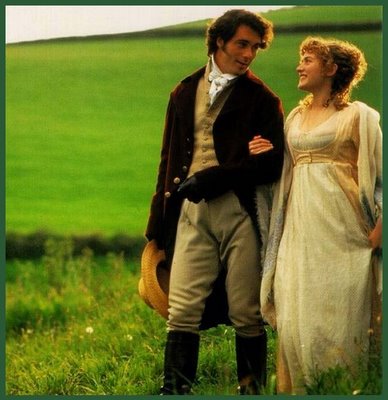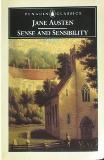Sense and Sensibility
Sense and Sensibility
 |
|
| Articles on Sense and Sensibility |
|
|
| Plot Summary |

Mr. Dashwood died, leaving his mother and three daughters, Elinor, Marianne and Margaret, with very little means to support themselves. Quiet, homely Elinor develops an affection for Mr. Edward Ferrars, her sister-in-law's wealthy brother, and her feelings appear to be reciprocated, until she discovers that he has been secretly engaged for many years to Lucy Steele, whom he met in his youthful days but does not love anymore. When she learns of the engagement from Lucy herself, she is heartbroken. Though Elinor and Edward harbor strong feelings of love for one another, he feels bound by his commitment to Ms. Steele. Elinor feels resigned to accept that commitment and accepts the prospect of remaining unmarried. Then suddenly Edward receives a letter from Lucy informing him that she has fallen in love with his brother, Robert, and they have married. Edward goes to Elinor to express his true feelings and they are reunited happily in the end. In contrast to her elder sister, Marianne is beautiful, outgoing, excitable, passionate and romantic. When she is caught in a storm with an injured leg, she is rescued by the dashing young Mr. Willoughby who happened to be passing by and carries her safely home. Marianne is charmed and swept off her feet by his physical appearance and gallant manners. Willoughby courts her and leads her to believe he is deeply in love. She is heartbroken when she later learns about his bad reputation with women and his engagement to a wealthy woman for her money. Marianne discovers that a lover's character, capacity for real affection and personal values are a far truer and more lasting basis for successful relationship than external appearances. She matures and marries Brandon, a 37 year old Colonel who loves her deeply. |
Directed by Ang Lee
Book written by Jane Austen
Screenplay by Emma Thompson
Starring Emma Thompson as Elinor Dashwood,Kate Winslet as Marianne Dashwood
Hugh Grant as Edward Ferrars,Greg Wise as John Willoughby
Copyright belongs to Columbia Pictures Corporation
- Wikipedia provides the plot summary, background, publication history and extensive links to sites on Sense and Sensibility, the cast and producers.
- The Internet Movie Database, IMDB has information related to the movie and its actors.
- HomeVideos offers interesting movie reviews of Sense and Sensibility.
- Free eBook can be downloaded.
- Essays on Literary criticism of Sense and Sensibility.
- Watch Sense and Sensibility Trailer from YouTube.
Level 5 - Affection
Affection is emotional enjoyment of the other person. Affection emanates from the heart. Energy expressing in our emotional center generates intense feelings of affection. At the physical level there is an urge to hold, grasp, and possess the other person in order to derive security, comfort or pleasure from the interaction. At the emotional level there is an urge to give oneself to the other person in order to please and make the other person happy. When affection is very physical, it can be possessive and demanding. True emotional affection for another person is incapable of shouting, anger or meanness of any kind. It is only the vital ego that wants to dominate which can try to hurt the other person. The higher and purer the affection, the less the intensity of the sexual urge. At the same time physical intimacy becomes far sweeter and uplifting because the intensity comes from the pure enjoyment of one’s affection for the other person.
Frank & Mary
In Dr. Thorne, Anthony Trollope portrays the love story of Frank Gresham and Mary Thorne. Frank is the descendant of a long line of Greshams, the richest landowners in their county who had served as its representative in Parliament for many generations. His mother came from a titled and far wealthier aristocratic family. Her social and material demands were so great that Frank’s father was forced to borrow heavily on the family property and eventually to sell a large part of the estate to a self-made Sir Roger Scatherd, a millionaire businessman. Gresham’s debts to Sir Roger continued to mount, jeopardizing what remained of Frank’s inheritance. Mary Thorne was the illegitimate, adopted niece of Dr. Thorne, the Greshams’ family physician. Both Frank and Mary believed she was actually the doctor’s daughter, though Frank’s parents knew and kept the secret during years when the children grew up together as playmates. When Frank came of age he announced his intention of marrying beautiful Mary. His mother vigorously protested and sent Frank away, arguing that Frank must marry a wealthy woman in order to restore the family’s financial fortunes. In spite of her ardent love for Frank, Mary did all she could to discourage Frank from displeasing his parents. But Frank remained true and adamant in his love for her, even when he was informed that she was illegitimate as well as penniless. Frustrating all his mother’s attempts to prevent it, Frank finally declared his intention of marrying Mary. Then it was revealed by Dr. Thorne that Mary was actually the niece and heir to the deceased Roger Scatherd’s enormous fortune, which meant that she already held legal title to more than half of the Gresham property. Frank’s unwillingness to renounce his love for Mary in spite of intense social pressure and the prospect of ruin, and Mary’s unwillingness to accept his love for fear of the harm and disgrace it might bring on him and his family, reflect the depth of affection with which they loved one another. The sincerity of their feelings enabled each of them to willingly sacrifice for the good of the other. More significantly, it had the strength to fully restore Frank’s family heritage and Mary’s social legitimacy. Love has that power over life.
Inman & Ada (Cold Mountain)
When it gives rise to physical or vital attraction, love at first sight may last only as long as the partners are in physical or social contact. But when it touches the deeper emotions of the heart, even a few moments together can give birth to an affection that outlives years of separation and silence. It forms an emotional bridge of connectivity that can enable the lovers to overcome incredible obstacles to reunite. In Cold Mountain, a beautiful city-bred preacher’s daughter named Ada Monroe meets a shy, handsome woodworker named Inman in a secluded rural part of North Carolina at the outbreak of the Civil War. Though they exchange only a few formal words, their hearts respond to one another. When Inman enlists to fight for the South, they exchange photographs and a single parting kiss. After the death of her father, Ada finds herself helpless, defenseless and pursued by a local bully named Teague. Daily she voices a heart-felt prayer for Inman to return. The sins he has committed in battle make Inman feel unworthy of her love. Only partly recovered from a serious wound received in battle, he risks death for desertion and travels the long dangerous road back to Cold Mountain. At one point he is given shelter by a beautiful young woman with child, who offers herself to him. In spite of feeling a strong physical attraction for her, his longing for Ada prevents him from responding to her invitation. Inman eventually meets Ada and after she conceives with a child, he then kills Teague before being mortally wounded himself. His love was powerful enough to find her and protect her and leave her with a son to raise. The strength of their affection could achieve this much despite the extreme social turmoil and destruction of war.
Immortal Infatuation (Romeo and Juliet)
We find a similar instance of intense emotional love in Shakespeare’s Romeo and Juliet. Here too, the young lovers were separated by powerful social barriers because they came from traditionally warring families. Here too, the lovers cared only for one another and threw aside the objections of family and society. Why then did their love end in the tragedy rather than blissful fulfillment? In this case, the lovers were extremely young, very impulsive and desperately impatient. Unlike Frank and Mary, they lacked the patience and maturity to wait for circumstances to improve. Patience requires strength. Their love had intensity but no strength to wait and persevere. Impulsiveness and impatience can never serve as the basis for accomplishment in life or romance. True romance is forgetful of self. It requires sacrifice not wild, reckless or desperate demands. It is willing to give with no thought of return and regards only the happiness and fulfillment of the beloved.
Lancelot & Guinevere (First Knight)
Lady Guinevere’s escort is attacked by a powerful warlord while she is en route to Camelot to marry the noble King Arthur. Lancelot, a wandering vagabond swordsman, rescues her from the attackers. He is instantly attracted by Guinevere’s majestic beauty and noble character. She feels the powerful lure of his physical manliness and courage, but resists his sexual advances. Lancelot arrives in Camelot just in time for her wedding with Arthur. Shortly afterwards she is kidnapped by the same warlord, who wants to gain her kingdom by blackmail. Again Lancelot single-handedly saves her. His confidence, courage and willingness for self-sacrifice move her deeply and she has to struggle not to give in to the powerful emotions that draws them to one another.
Knighted for his heroic service to the crown, Lancelot remains in Camelot, secretly nurturing an all-consuming passion for the queen. Eventually he comes to accept the ideals that Arthur stands for and decides out of respect for the King and Queen to leave Camelot forever. His acceptance of noble ideals elevates him even further in her emotions. Heartbroken to be losing him forever without ever having felt the joy of his love, she offers one kiss. Arthur discovers them embracing and is furious at their treasonous betrayal. In defense she explains that her love for both men is real and true, but different. She loves and worships Arthur with her all her heart’s purity and mind’s admiration. At the same time she feels powerfully drawn toward by a physical and vital passion elevated and ennobled by a deep emotional bond of affection and self-giving. The contrast between the two relationships brings out both the most positive aspects and two very different forms of romance.
Jerry & Dorothy (Jerry Maguire)
This movie depicts the unlikely romance between a high flying, high energy sports agent and a shy, homely accountant. After Jerry writes a memo proposing that his agency he works for adopt higher ethical standards in serving their clientele, Jerry is summarily dismissed from his lucrative job. Inspired by the courage and values espoused in his memo, Dorothy is the only employee at the firm willing to stand up for principles and follow Jerry’s lead. So she quits her job and together they establish a separate company, but manage to retain only one of Jerry’s former clients. With no income and no prospects, they struggle to make ends meet. When Jerry’s glamorous girlfriend also deserts him, he is left failed and friendless. Through it all, Dorothy remains loyal and offers unstinting support. Jerry develops a fondness for Dorothy’s son from a previous marriage, has a one-night affair with Dorothy, and then overhears her telling her sister how much she loves him. Finally Dorothy senses that Jerry is only maintaining their relationship out of sense of appreciation for the support she has offered him, so she announces that she is leaving to take a job in another city. Jerry impulsively proposes to her on the spur of the moment and they marry. Again after marriage, she feels that she and her son have trapped Jerry into a relationship that does not suit him and she decides to withdraw. After months of total failure in his work, Jerry finally has a major breakthrough when his sole client achieves superstar status and signs a huge multi-year contract. Finally vindicated in the decisions he has taken, Jerry discovers that without Dorothy his success brings him no sense of fulfillment, so he rushes back to reunite with her.
Through their relationship Jerry moves from the charms of sexual and vital attraction to discover the greater richness and sweetness of lasting affection. As in the case of Mae Braddock in Cinderella Man, Dorothy’s intense goodwill and affection are a powerful support for her lover’s high achievement.
Edward & Elinor (Sense & Sensibility)
Elinor, Marianne and Margaret are daughters of Mr. Dashwood who died leaving his wife and daughters with very little means to support themselves. Elinor develops an affection for Mr. Edward Ferrars, her sister-in-law's wealthy brother, and her feelings appear to be reciprocated. Edward has been engaged for many years to Lucy Steele, whom he met in his youthful days but does not love anymore. He wants to tell Elinor about it, but he does not find a suitable opportunity. Later Elinor hears about it from Lucy herself and is heartbroken. Though Elinor and Edward harbor strong feelings of love for one another, he feels bound by his commitment to Ms. Steele. Elinor feels resigned to accept that commitment and remain an aging spinster. Then suddenly Edward receives a letter from Lucy informing him that she has fallen in love with his brother, Robert, and they have married. Edward goes to Elinor to express his true feelings and they are reunited happily in the end.
The story vividly represents the power of pure emotions, unmixed by possessiveness, impulsive attachment, egoism or assertiveness. Elinor controls and refrains from expressing her deep affection for Edward until the power of her love removes all obstacles and brings her love to her. Her love is sharply contrast to the flighty impulsive physicality of her sister Marianne, described in Level 2.
Learn unfailing strategies to rise up the scale of romance in your relationship
If you would like to raise general questions on romance, love, marriage and relationship or about any of the content in this article, please post your entry in the appropriate forums
Level 2 - Physical Attraction
Most people are attracted to people who other people find most attractive and desirable, like the young woman who decided to abandon her interest in a boy she really liked because she knew her friends would never approve of the way he dresses. This is what exactly Lydia did. She is a lively and energetic girl, bold, aggressive and always smiling, exactly what you might expect of a precocious teenager experiencing the first thrill of adult social life and popularity. She wears the most fashionable dresses, has many friends and frequent invitations to parties and dances. She thinks about nothing but flirting, has no goals or responsibilities, no manners other than her liveliness and no formed values or character. She is self-centered, selfish and foolish.
Lydia & Wickham (Pride & Prejudice)
When Elizabeth’s youngest sister Lydia fell in love – if we can call it love – she was attracted to George Wickham, a tall, slim and dashing young military officer with a winning smile and charming manners, without knowing anything of his background, family, character, intentions or personal reputation as a gambler, womanizer and scoundrel. Lydia valued him for his handsome appearance and popularity with his fellow officers and with other women. He was the heart throb of all the girls whereever he went. He deceived people with his good looks and excellent manners. He was deeply in debt and seeking a rich bride to solve his financial problems. As soon as Lydia’s eyes fell on him she singled him out as an object to be attained at any cost. At a time when a woman’s reputation and marriagability depended on her chastity, she agreed to run away with him based on a vague promise of marriage in the future. For Wickham the only motive was a weekend fling that he would forget as soon as a more interesting and eligible partner came his way. Yet he was ultimately pressurized into marrying her in order to escape from public disgrace and financial ruin.
It is not surprising that a relationship founded on superficial interests, physical appearance and sexual attraction should prove a poor basis for lasting harmony and affection. Yet how often this is the case. Vibrant youthful energy imparts an enchanting flush of charm and beauty to many young people which quickly gives place to dull and unappealing plainness a few years later. The excitement, enthusiasm and adventurousness of carefree youth unburdened by responsibilities is easily mistaken for more positive, lasting endowments of personality. But the novelty of infatuation, especially physical allurement, is rarely lasting. At this level people value other people almost as if they are precious objects to be obtained and possessed. Under the pressures of work and family responsibilities, youthful enthusiasm readily gives way to frustration, friction, quarrels, anger, distrust, jealousy, suspicion and sometimes violence. If at all the relationship survives, it survives only on intensity without a stable or organized foundation for lasting success.
Physical attraction can be very intense, especially during the early stages of relationship, so intense that it is often mistaken for real love that will last forever. But over time the novelty of the experience tends to wear off. Sexual attraction by itself is not a sufficient basis for long term positive relationships. Physical attraction may form a natural positive part of any relationship, but relationships based primarily on physical attraction will be fulfilling only to those in whom the satisfaction of their sensations is the primary source of interest and enjoyment in life. Those who value family, career accomplishment, emotional commitment, education and higher ideals or values usually discover physical sensations an inadequate basis for lasting relationship. Lydia got what she aspired for and was the envy of her friends. But at what gain and what cost? Wickham’s attraction for her lasted only weeks and hers for him a few months. After that they each spent their lives searching for satisfaction outside their relationship.
Scarlett & Rhett (Gone with the Wind)
The turbulent relationship between Rhett Butler and Scarlet O’Hara depicts the problems inherent in a relationship based primarily on physical attraction. Scarlett is a narcissistic plantation belle, the daughter of a French aristocratic mother and an Irish peasant immigrant who managed to acquire a large cotton plantation and a lovely cultured wife. Scarlett inherited her mother’s beauty and manners and her father’s raw energy and ambition. Beneath her polished exterior, she is a dynamo of unruly impulses. Although her beauty and flirtatious behavior have enslaved almost every young man in the region, Scarlett longs to marry Ashley Wilkes, the educated son of a distinguished Southern family. Heartbroken when Ashley marries his cousin Melanie instead, Scarlett marries Melanie’s brother just to spite Ashley. When her husband is killed in the war, she marries a store owner for his money, but never abandons her hope of finally winning Ashley for herself.
Scarlett’s only real relationship is with Rhett Butler, the dashing young blockade runner who was disowned by his family and expelled from Charleston for dishonorable behavior. Rhett sees right through Scarlett’s façade of ladylike elegance and knows the ruthless, unscrupulous, wildcat which lies behind her pretty face. Attracted by her energy, strength, courage and beauty, he pursues her first to become his mistress and later his wife. Scarlett’s heart has always been after Ashley. She admires Rhett’s brute strength, his courage to defy society, his tall handsome appearance and his considerable wealth, but she never feels for him anything like true affection. Their turbulent and unfulfilling marriage is marred by constant quarrels. After the death of their young daughter, Rhett finally leaves her. Only then does she realize how much she needs and wants him. Their failed partnership founded on sexual energy, physical strength, the desire to control and dominate shows the inherent instability and potential destructiveness of negative relationship at this level.
Avery’s response to adversity (Jerry Maguire)
Relationships based on physical and sexual attraction often end in anger, violent upheaval and bitterness. Jerry Maguire is a high flying sports agent engaged to a very attractive, sexy hard driving business woman, Avery Bishop. When in a moment of idealism Jerry speaks out against the hypocritical policies of his firm and loses his job, he comes to Avery looking for understanding and support. Instead, she bluntly tells him his act was stupid and foolish and refuses to offer a drop of sympathy. Avery’s response was not just based on her own nasty personality. It exposed the fact that their relationship was based on only one thing – pleasure. Jerry was a good looking object to possess and enjoy. When the fun ended, she expressed her scorn. As soon as the pleasure ended, the relationship ended as well. When Jerry responded to her caustic abuse by telling her the relationship was over, she was hurt and angry, not because she would miss him, but because to be jilted was an insult to her ego. To her relationship is only a way to take. It has nothing to do with giving.
Woman Hunter
The guy who tried to hire a consultant to help him sleep with a woman he was attracted to in Hitch may have succeeded in his immediate conquest but did not fare any better in relationships than Wickham.
Rob & Laura (High Fidelity)
Progress upward from level 2 begins with the realization that in order to be fulfilling, human relationship must be based on something more than physical satisfaction. High Fidelity depicts a man who has explored all the possibilities of level 2 relationships and discovered them to be unstable, unsatisfactory and empty. His lifetime pursuit of the perfect physical relationship is an example of how the high ideal of romance is perverted into a shallow, selfish fantasy – a good example of everything that real romance is not.
Rob’s frank introspection leads him to recognize the emptiness of his sexual pursuits and to yearn for a more lasting, meaningful and fulfilling relationship with Laura.
Marianne & Willoughby (Sense & Sensibility)
Mr. Dashwood dies leaving his wife and three daughters with no home and little means to support themselves. His second daughter, Marianne, is excitable, passionate, romantic and driven by intense emotions. When she is caught in a storm with an injured leg, she is rescued by the dashing young Mr. Willoughby who happened to be passing by and carries her safely home. Marianne is charmed and swept off her feet by his physical appearance and gallant manners. Willoughby courts her and leads her to believe he is deeply in love.
She is overcome by intense passion for the man, which she expresses quite openly. After initial encouragement, Willoughby disappears from her life and refuses to answer her letters. She is heartbroken. She later learns that when his aunt threatened to disinherit him, he agreed to marry a wealthy heiress, Ms. Grey. She also discovers that he has ruined the reputation of a young woman by refusing to acknowledge their illegitimate child as his own.
Marianne experiences all the grief of a sensual attraction based on nothing more substantial than physical appearance and external behavior. She discovers that a lover's character, capacity for real affection and personal values are a far truer and more lasting basis for successful relationship than external appearances.
Alex & Claire (The Mirror has two faces)
Claire is the beautiful and vain younger daughter of a vain and aging mother who always considered physical beauty her greatest asset and is now plagued by the scars of middle age. Like her mother, Claire values her beauty above all else and has used it to snare handsome, gallant Alex into a marriage. Once having caught him and won his admiration, Claire can derive no further gratification for her vanity from the marriage, so she immediately starts pursuing younger men to reinforce her sense of being attractive. Mistaking physical attraction for love, the more affection Alex expresses, the less satisfied Claire becomes. She needs the excitement of fresh conquests to prove her worth. Finally she leaves Alex for someone else, who surely will not be the last in a series of failed relationships based on physical attraction.
David Larrabee(Sabrina)
The contrast between physical attraction and emotional love is beautifully portrayed in the love affair of two brothers with the chaffeur’s daughter. David is the handsome, playboy younger son of the fabulously wealthy Larrabee family of Long Island, owners of a multi-billion dollar business empire established by David’s father and expanded by his brother Linus and his mother. With great good looks, money to burn and all the leisure time in the world, David gallivants through New England’s high society courting, dating and sleeping with every attractive young debutante within his reach, with a long line waiting in the wings to become his next fling. After years of free-wheeling, David finally meets a beautiful physician, Elizabeth Tyson, who it the first woman he feels more than a passing physical attraction for. He has no idea that she is also an heiress, daughter of the man who is negotiating a multi-billion dollar merger with Linus. Finally on her urging, he proposes marriage and their engagement is announced. A few days later, the Larrabee chaffeur’s daughter, Sabrina, returns from Paris a full grown, gorgeous woman. A year abroad has not only helped Sabrina blossom, but also helped her outgrow the childhood crush she felt for David. But what she has outgrown, David suddenly acquires. Unable even to recognize her as the clumsy teenager who climbed trees on the Larrabee estate, David feels powerfully attracted to her and is ready to call off his engagement with Elizabeth so he can pursue Sabrina, even if it means scotching the Tyson deal for his family. At the last moment, David discovers that his workaholic, level-headed brother Linus is actually so much in love with Sabrina that he too is ready to scotch the deal in order to see Sabrina happy. After trying so hard to keep David and Sabrina apart, now Linus wants to send David to Paris to be with her. Although he finds her ravishingly attractive, David is able to see that Linus is more deeply and truly in love with Sabrina than he could ever be. In a rare moment of self-awareness and sincerity, he dispatches Linus to Paris, agrees to marry Elizabeth and takes over negotiations on the merger.
Learn unfailing strategies to rise up the scale of romance in your relationship
If you would like to raise general questions on romance, love, marriage and relationship or about any of the content in this article, please post your entry in the appropriate forums



 The relationship between Marianne and Willoughby is an example of Level 2 Physical Attraction on Scales of Romance.
The relationship between Marianne and Willoughby is an example of Level 2 Physical Attraction on Scales of Romance. 

